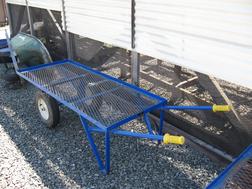Kids in GArdens
This all-day class was offered for teachers by The Watershed Project in Richmond, CA. The day included a soil analysis of soil from our own sites, a tour of the grounds, worms and bins, native plants, and a huge resource binder. It was well worth the $30 price and included a small grant upon completion and documentation of a project from the binder. I took plenty of photos as resources and inspirations for my own garden program.
In a greenhouse, framed tables covered with hardware cloth are used to allow planters to drip.
A handy cart/wheelbarrow for transporting potted plants.
A narrow pathway is delineated by rocks.
Outdoor classroom!
Paper mulch under wood chip pathway to help prevent weeds.
NOTE: It is common practice to add cardboard or plastic under pathways to prevent weeds. It is not an easy procedure, the materials on top (such as wood chips) often get brushed to the side, the surface feels and sounds odd to walk upon, and if plastic is used it will disintegrate into small pieces. And weeds will still grow! It is far simpler to have an ongoing weed maintenance program.
Mint pot is placed on top of concrete to avoid toxic soil. Mint should be planted in this fashion anyway to prevent spreading.
Broken concrete wall. This material is now commonly called "urbanite."
Logs serve as garden borders...
...As do rocks. NOTE: After teaching in various types of gardens over the years, I can add that rocks take a lot of maintenance. They gradually sink into the ground and kids move them all over the place. At my previous school I was required to move them back constantly. Logs provide sitting places, refugia for small animals, and a relatively stable, attractive border. Children can roll them over to search for small animals and they provide a ready lesson in decomposition.
Adult-level potting/storage benches.
Compost bin with removable fronts.
NOTE: One valuable lesson from this day was that decomposition happens all the time. While it can be helpful to maintain the proper levels of moisture (as damp as a wrung-out sponge) and green and brown-based waste, it will all eventually turn into compost eventually, no matter what's put inside and what moisture levels are maintained.
NOTE: it can be useful to avoid putting food into garden compost so as not to attract rats and raccoons.
Terra cotta repurposed as a border for raised beds.
Barrel planter on top of concrete pieces.
Cute bees painted on recycled wood raised beds.
Bathtub raised bed.
Planted toilet waiting for plants to be added to tank.
Materials being reused and repurposed.
By Heather Taylor, teachoutside@gmail.com. You are welcome to share all materials with credit to her.





















